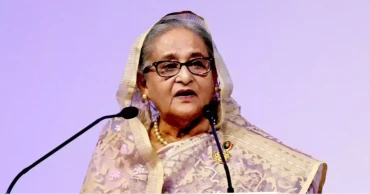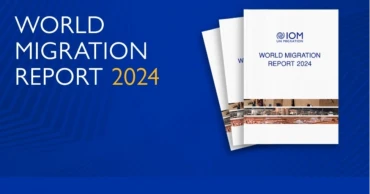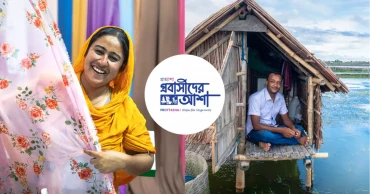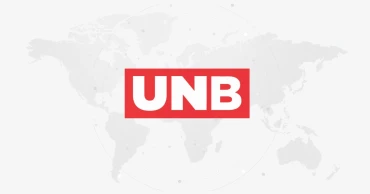International Organization for Migration
Bangladesh finalises National Action Plan for Global Compact for Migration
Bangladesh has finalised its National Action Plan (NAP) for the Global Compact for Migration (GCM). The soft adoption of the GCM NAP underscores Bangladesh’s strong commitment to safe, orderly and regular migration and to protecting the rights of migrants, said International Organization for Migration (IOM), Bangladesh.
It was finalised following a multi-stakeholder consultation on Monday. Ministry of Expatriates' Welfare and Overseas Employment's Senior Secretary and Foreign Affairs Secretary Asad Alam Siam co-chaired the consultation meeting.
British High Commissioner meets Army Chief
The process brought together line ministries, civil society, development partners, the private sector and migrant communities, ensuring the GCM NAP is practical, nationally owned and grounded in real needs. With guidance from the Bangladesh Migration Compact Taskforce, IOM - UN Migration provided technical support throughout the drafting process.
18 days ago
Global displacement hits record 83.4 mln in 2024
The global number of internally displaced persons (IDPs) climbed to an all-time high of 83.4 million by the end of 2024, the International Organization for Migration (IOM) reported.
The Internal Displacement Monitoring Centre's newly published Global Report on Internal Displacement 2025 highlights that persistent conflict and violence continue to be the primary causes of displacement.
By the close of 2024, 73.5 million people were uprooted by conflict and violence — an increase of 80 percent compared to six years ago.
Sudan recorded the highest number of IDPs worldwide, with 11.6 million people displaced due to conflict. In the Gaza Strip, nearly the entire population was displaced by year’s end.
The report further reveals that disasters were responsible for 45.8 million displacement events in 2024 — nearly twice the average annual figure of the past ten years.
Japan, IOM sign $3.2mn deal for Bangladesh’s flood recovery
Although many of those affected managed to return home within the year, approximately 9.8 million people remained displaced by disasters at the end of 2024.
"These figures are a clear warning: without bold and coordinated action, the number of people displaced within their own countries will continue to grow rapidly," said IOM Director General Amy Pope.
9 months ago
ERD signs €5 mln grant deal with IOM to boost migration, reintegration services in Bangladesh
The Economic Relations Division (ERD) has signed a grant agreement worth Euro 5,000,000.00 with International Organization for Migration(IOM) to strengthen initiatives related to migration and reintegration.
The agreement titled ‘Strengthened Service Delivery Systems for Improved Migration Management and Sustainable Reintegration’ that was signed on Tuesday will contribute to implementing the four-year project by the International Organization for Migration with fund support from the European Union.
The project will support the initiatives of the Ministry of Expatriates' Welfare and Overseas Employment and Ministry of Foreign Affairs to strengthen initiatives related to migration and reintegration.
The objective of the project is to contribute to strengthening gender-responsive and right-based migration and reintegration services in Bangladesh that ensure safe and orderly migration practices and the sustainable reintegration of migrants and returnees.
The project aims to achieve this through two main outcomes: Strengthening Migration Service Delivery Systems and Supporting Vulnerable Returnees.
NBR lifts suspension of Tax Tribunal member Shafiqul, cites no reason
Md. Shahriar Kader Siddiky, Secretary of the Economic Relations Division, and Lance Bonneau, Chief of Mission, IOM Bangladesh signed the agreement.
Representatives from UN Wing of ERD and concerned Government agencies were present at the signing ceremony.
This project is built to support the Government’s priorities for migration and reintegration aligning the initiatives with global, regional and national development framework and priorities.
10 months ago
IOM opens mental health support service center in Rohingya camp
The International Organization for Migration (IOM) launched a Mental Health and Psychosocial Support (MHPSS) one-stop service centre for the Rohingya community in Cox’s Bazar.
Irma van Dueren, Ambassador of the Kingdom of the Netherlands to Bangladesh, Fathima Nusrath Ghazzali, Acting Chief of Mission of IOM Bangladesh, and Md Shamsud Douza, Additional Refugee Relief and Repatriation Commissioner inaugurated the facility.
The inauguration ceremony also featured a guided tour of the facility, cultural performances led by Rohingya artisans, and the award of certificates to the refugees who have completed psychosocial and protection skills development programmes.
An innovation in refugee care, this centre is designed to address the urgent mental health, psychosocial, protection service and Sexual and Reproductive Health (SRH) needs of the Rohingya refugees, offering an integrated approach to service delivery.
The centre combines multiple essential services under one roof, making it easier for refugees to access the support they need without the burden of visiting multiple facilities, said a press release.
The centre’s holistic model is designed to enhance the well-being and resilience of the community by providing private counselling rooms for mental health sessions, safe spaces for child-friendly services and socio-relational activities, SRH services including family planning, menstrual regulation, and adolescent health education, and protection services for survivors of Gender-based Violence (GBV). In addition, the centre also hosts a mini-Rohingya Cultural Memory Centre (RCMC). This portion includes guided tours, cultural events, master classes, arts and crafts by skilled Rohingya artisans, and storytelling sessions to preserve and celebrate Rohingya culture.
Dhaka seeks IOM’s role in protecting rights of Bangladeshi migrant workers
The facility also includes a multipurpose space for community meetings, workshops and activities that engage the refugees and promote participation in mental health and psychosocial support programmes. An important feature of the centre is ‘Shanti Barir Bagan’, a community garden that fosters mental health and well-being through engagement in gardening activities.
“The Government of the Netherlands has Mental Health and Psychosocial Support as a priority within its humanitarian interventions. The One Stop Service Centre realised by IOM for Rohingya refugees Camp 20 Extension supported by the Government of the Netherlands and others, is a good example of the integrated approach needed for MHPSS,” Ambassador Irma van Dueren said.
“Many more of these centres are needed for the Rohingya Refugee population. I want to thank the IOM team and the Government of Bangladesh for this impressive achievement.”
“Marking an important milestone in enhancing the well-being and resilience of refugees in the camps, this centre is a testament of IOM’s commitment to supporting the mental health, protection and preservation of Rohingya cultural heritage of the Rohingya refugees,” Fathima Nusrath Ghazzali, Acting Chief of Mission of IOM Bangladesh, said.
The Netherlands partially funded the construction and provision of continued integrated MHPSS, protection and sexual reproductive health (SRH) services at this one-stop service centre, along with support from the Asian Development Bank (ADB), Department of Foreign Affairs and Trade (DFAT) of Australia, the Global Affairs Canada (GAC), European Civil Protection and Humanitarian Aid Operations (ECHO), Japan, Bureau of Population, Refugees, and Migration (PRM) of the U.S. Department of State, World Bank and Foreign, Commonwealth and Development Office (FCDO) of the United Kingdom.
1 year ago
Need to find new partners to raise more int’l fund for Rohingyas: PM Hasina to IOM
Prime Minister Sheikh Hasina on Tuesday (May 07, 2024) urged the International Organization for Migration (IOM) to search for new partners to increase the international fund for Rohingyas who have taken shelter in Bangladesh to escape persecution in Myanmar.
“Since the the assistance for Rohingyas has declined, the IOM should look for new partners to raise more funds for them,” she said.
The premier made this call when IOM Director General Amy Pope paid a courtesy call on her at the latter’s official residence Ganabhaban.
PM’s Speechwriter Md Nazrul Islam briefed reporters after the meeting.
PM opens newly constructed AFIP Bhaban, Sena Prangan Bhaban in Dhaka Cantonment
During the meeting, they discussed the UN joint response plan for the Rohingya humanitarian crisis as the international fund for supporting Rohingya refugees has significantly declined.
Hasina also asked IOM to help relocate more Rohingyas to Bhashanchar (island) from Cox’s Bazar camps as accommodation and livelihood facilities are there including self-employment, education for their children, healthcare services and infrastructures for some 100,000 people in Bhashanchar.
Some 30,000-35,000 Rohingyas have already relocated to Bhashanchar from Cox’s Bazar camps.
The IOM Director General who visited Cox’s Bazar Rohingya camps on Monday raised the security issue in the camps.
In this context, the premier said now conflict continues in Myanmar and Rohingya people are also divided in different groups and sub-groups in the overcrowded camps in Cox’s Bazar. So, they are engaged in internal conflicts, she added.
Stay away from upazila polls: PM Hasina tells ministers and AL MPs
Besides, the Rohingya people have outnumbered the host community in Cox’s Bazar. So, there are,conflicts for limited resources there, she said.
She, however, said adequate number of law enforcement agencies have been deployed to maintain the law and order in the Rohingya camps areas.
Talking about migration, IOM Director General Amy Pope stressed the need for imparting proper training to migrants on demand-driven skills, language and culture of the destination countries.
In response, the prime minister said her government has attached topmost priority to imparting training on trade-based skills and languages.
She said her government has taken up many programmes including a bank loan scheme for the welfare of expatriates.
“Both source and host countries should protect the interest of migrants as they contribute to both economies,” said Hasina.
Noting that migration is a natural process, she said if poverty reduces, the intensity of migrants would decline.
In this time, she mentioned the poverty rate has declined sharply in Bangladesh in the last 15 years and now the extreme poverty rate is only 5.6 percent here.
Talking about the internal migration, PM Hasina said people also migrated internally for the climate change as Bangladesh is one of the most vulnerable countries for the climate change impacts. The people are being migrated internally for river erosion, flood and cyclone, she said.
She said her government gives houses to climate-induced refugees under the Ashrayan project. More than 4,000 climate refugees were already given abodes alone at Khurushkul in Cox's Bazar by construction of multi-storied buildings there, she cited.
The PM said her government also gives the homeless people the climate-resilient houses on the coastal areas and floating houses in flood-prone areas free of cost.
Principal Secretary M Tofazzel Hossain Miah and Expatriates’ Welfare and Overseas Employment Secretary Md Ruhul Amin were present.
1 year ago
Migrant remittances now outpace foreign investments in developing countries: IOM report
International migration remains a driver of human development and economic growth, highlighted by a more than 650 percent increase in international remittances from 2000 to 2022, rising from USD 128 billion to USD 831 billion, according to a new global report released today.
The growth continued despite predictions from many analysts that remittances would decrease substantially because of COVID-19.
The International Organization for Migration (IOM) launched the World Migration Report 2024, which reveals significant shifts in global migration patterns, including a record number of displaced people and a major increase in international remittances.
IOM Director General Amy Pope formally released the report in Bangladesh, which stands at the "forefront of migration" challenges, including emigration, immigration and displacement.
"We hope the report inspires collaborative efforts to harness the potential of migration as a driver for human development and global prosperity," DG Pope said.
By choosing Dhaka as the report's launch site, IOM not only highlights the country's efforts in supporting vulnerable migrants and fostering pathways for regular migration but also recognizes Bangladesh's important role in shaping global migration discourse and policy, IOM said.
As a Global Compact for Safe, Orderly, and Regular Migration Champion country, Bangladesh has demonstrated a strong commitment to addressing migration issues and implementing policies that safeguard migrants' rights, it said.
Read more: Global actors pledge to collaborate on transformation of Bangladesh agriculture
This proactive engagement aligns with IOM's strategic objectives, making Bangladesh an ideal location to launch the 2024 World Migration Report.
Foreign Minister Dr Hasan Mahmud said as one of the GCM champion countries, Bangladesh will not only continue to act upon the pledges it has made for its domestic context but would also take up emerging issues and challenges pertaining to migration and development for informed deliberations at the international level.
“The World Migration Report 2024 helps demystify the complexity of human mobility through evidence-based data and analysis,” Pope said at the launch.
“In a world grappling with uncertainty, understanding migration dynamics is essential for informed decision-making and effective policy responses, and the World Migration Report advances this understanding by shedding light on longstanding trends and emerging challenges.”
Of that 831 billion in remittances, 647 billion were sent by migrants to low and middle-income countries. These remittances can constitute a significant portion of those countries' GDPs, and globally, these remittances now surpass foreign direct investment in those countries.
Highlighting key findings, the report reveals that while international migration continues to drive human development, challenges persist.
Read more: UK Minister for Indo-Pacific arrives Tuesday on two-day visit
With an estimated 281 million international migrants worldwide, the number of displaced individuals due to conflict, violence, disaster, and other reasons has surged to the highest levels in modern-day records, reaching 117 million, underscoring the urgency of addressing displacement crises.
Migration, an intrinsic part of human history, is often overshadowed by sensationalized narratives.
However, the reality is far more nuanced than what captures headlines.
Most migration is regular, safe, and regionally focused, directly linked to opportunities and livelihoods.
Yet, misinformation and politicization have clouded public discourse, necessitating a clear and accurate portrayal of migration dynamics.
IOM’s World Migration Report, with its innovative digital tools and comprehensive analysis, aims to help dispel myths, provide critical insights, and inspire meaningful action in addressing the challenges and opportunities of human mobility.
This launch is part of IOM Director General’s first three-day visit to Bangladesh.
Chief of IOM Mission in Bangladesh Abdusattor Esoev, former Foreign Secretary Shahidul Haque, senior government officials and diplomats stationed in Dhaka were present at the report launching ceremony.
Read more: UK Minister for Indo-Pacific in Dhaka to ‘strengthen’ economic, security, migration partnership with Bangladesh
1 year ago
Photo exhibition 'Prottasha: Hope for Migrants' to be held in Dhaka Tuesday
The International Organization for Migration (IOM) will organize a photo exhibition titled “Prottasha: Hope for Migrants” on Tuesday to raise awareness and to persuade the masses about sustainable reintegration, safe migration and migration governance.
Storytelling is an effective tool to inform and make people aware of the issues of safe migration, sustainable reintegration, and migration governance.
The exhibition will bring together a range of migration-related stories to help us understand the complex experience and contextualize some of the opportunities and challenges of migration in Bangladesh.
read more: Swift return of irregular migrants to help promote legal migration: European Commissioner
It will also help understand migration and its complexities, said the IOM on Monday.
Besides, the stories will present the impact and results of the work on safe migration and sustainable reintegration of returning migrants under the Prottasha project.
The photo exhibition will remain open to all at Pan Pacific Sonargaon Hotel in Dhaka on Tuesday from 3pm to 7pm
In addition, an infotainment show featuring pot songs, song performances, short films, and quizzes will be organized during the event.
read more: Migrant workers’ rights: UN expert for monitoring recruitment process
The photo exhibition is being organized under the European Union funded ‘Bangladesh: Sustainable Reintegration and Improved Migration Governance (Prottasha) project.
Since 2017, IOM has implemented the project, under the guidance of the Government of Bangladesh and in partnership with BRAC.
3 years ago
UN agency: Ukraine exodus reaches 1.45 million
The number of people who had left Ukraine reached 1.45 million as Russia's war on Ukraine entered Day 10 Saturday, according to the International Organization for Migration (IOM).
The UN migration agency, citing figures from government ministries in countries where they arrived, said 787,300 of them went to Poland.
Around 228,700 fled to Moldova, 144,700 to Hungary, 132,600 to Romania and 100,500 to Slovakia.
Nationals of 138 countries crossed Ukraine's borders into neighbouring nations, the IOM said.
Also read: Ukraine wants special tribunal to judge Putin
The military offensive in Ukraine has destroyed civilian infrastructure and civilian casualties and forced people to flee their homes seeking safety, protection and assistance.
In the first week, more than 1 million refugees from Ukraine crossed borders into neighbouring countries, and many more are on the move both inside and outside the country.
As the situation continues to unfold, an estimated 4 million people may flee the country, according to the UN refugee agency (UNHCR)
In light of the emergency and paramount humanitarian needs of refugees from Ukraine, an inter-agency regional refugee response is being carried out, in support of refugee-hosting countries’ efforts, it says.
The regional refugee response plan brings together the UN, NGO and other relevant partners and primarily focuses on supporting the host country governments to ensure safe access to the territory for refugees and third-country nationals fleeing from Ukraine, in line with international standards.
It also focuses on the provision of critical protection services and humanitarian assistance, while displacement dynamics and needs continue to grow exponentially.
Also read: Refugee count tops 1 million; Russians besiege Ukraine ports
3 years ago
Weeklong Rohingya artworks exhibition begins in city
A weeklong exhibition of 100 cultural objects and artworks representing key aspects of Rohingya memory, experience, and aspiration began in the city on Sunday.
The International Organization for Migration (IOM) and the Center for Peace Studies (CPS) of the South Asian Institute of Policy and Governance (SIPG) of North South University (NSU) are hosting the exhibition that will continue till September 25.
The inaugural ceremony of the exhibition was held at NSU where the collection is being displayed.
Rohingya artisans of IOM’s Rohingya Cultural Memory Centre (RCMC) prepared the cultural objects and artworks, with the support of the Embassy of the Netherlands.
The exhibiting collection -- handmade by the camp-living refugees in Cox’s Bazar -- is a part of an ongoing effort by the RCMC to help comprehensively document and preserve the heritage of the Rohingya people.
IOM Bangladesh’s Chief of Mission Giorgi Gigauri said by showcasing the beauty and complexity of the Rohingya heritage and people, the exhibition aims to empower the community and ensure the continuity of its cultural heritage for future generations.
"The RCMC offers a platform for the Rohingya people to share and build their stories with a global audience and to connect with the diaspora.”
READ: FM seeks Commonwealth solidarity for Rohingya repatriation
4 years ago
Deaths on maritime migration routes to Europe soar in first half of 2021: IOM
At least 1,146 people died attempting to reach Europe by sea in the first six months of 2021, according to a new briefing released by the International Organization for Migration (IOM) on Wednesday.
Deaths along these routes more than doubled so far this year compared to the same period in 2020, when 513 migrants are known to have drowned.
Read: 160 Bangladeshi migrants return from Libya with IOM support
The brief sheds light on the ongoing situation along some of the most dangerous maritime migration routes worldwide.
While the number of people attempting to cross to Europe via the Mediterranean increased by 58 per cent between January and June this year compared to the same period in 2020, more than twice as many people have lost their lives.
“IOM reiterates the call on States to take urgent and proactive steps to reduce loss of life on maritime migration routes to Europe and uphold their obligations under international law,” says IOM Director General António Vitorino.
Read: IOM ramps up health response as 2nd wave of COVID-19 hits Cox's Bazar
“Increasing search-and-rescue (SAR) efforts, establishing predictable disembarkation mechanisms and ensuring access to safe and legal migration pathways are key steps towards achieving this goal.”
The analysis, produced by the Missing Migrants Project at the IOM’s Global Migration Data Analysis Centre (GMDAC), shows an increase in deaths coupled with insufficient search and rescue operations in the Mediterranean and on the Atlantic Route to the Canary Islands, and at a time when interceptions off the North African coast are also on the rise.
So far in 2021, most of the men, women and children who died trying to reach Europe were attempting to cross the Mediterranean, where 896 deaths have been documented by IOM.
At least 741 people died on the Central Mediterranean route, while 149 people lost their lives crossing the Western Mediterranean and six died on the Eastern Mediterranean route from Turkey to Greece.
In the same period, some 250 people drowned attempting to reach Spain’s Canary Islands on the West Africa/Atlantic route. However, that count may well be low.
Hundreds of cases of invisible shipwrecks have been reported by NGOs in direct contact with those on board or with their families.
Such cases, which are extremely difficult to verify, indicate that deaths on maritime routes to Europe are far higher than available data show.
One example is from 24 March, when Sohail Al Sagheer, a 22-year-old Algerian rapper, went missing when he and nine friends left from Oran, Algeria to Spain.
His family conducted a frantic search for information about what happened to him, torn with rumors that he was among the victims of a shipwreck off Almería, Spain. His remains were finally recovered on 5 April, off the coast of Aïn Témouchent, Algeria.
The brief also shows an increase for the second consecutive year in North African states' maritime operations along the Central Mediterranean route.
More than 31,500 people were intercepted or rescued by North African authorities in the first half of 2021, compared to 23,117 in the first six months of 2020.
Such operations off the coast of Tunisia have increased by 90 per cent in the first six months of 2021 compared to 2020. In addition, over 15,300 people were returned to Libya in the first six months of 2021, almost three times higher than the same period in 2020 (5,476 people).
This is concerning given that migrants who are returned to Libya are subjected to arbitrary detention, extortion, disappearances, and torture.
The briefing highlights the ongoing data gaps on irregular maritime migration to Europe.
Better data, IOM said, can help states urgently address their commitments under Objective 8 of the Global Compact for Migration to “save lives and establish coordinated international efforts on missing migrants.”
4 years ago








.jpg)








